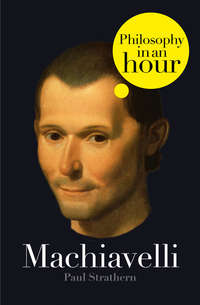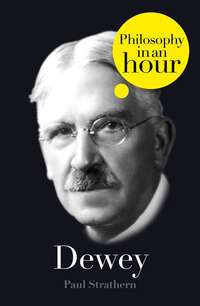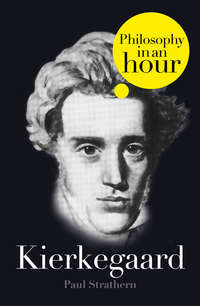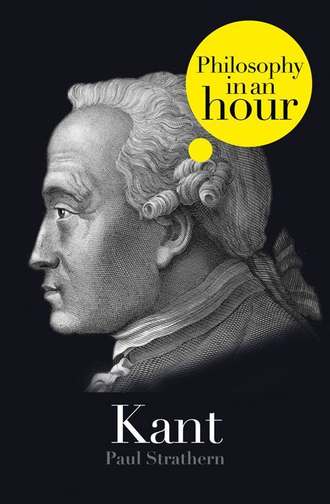
Полная версия
Kant: Philosophy in an Hour

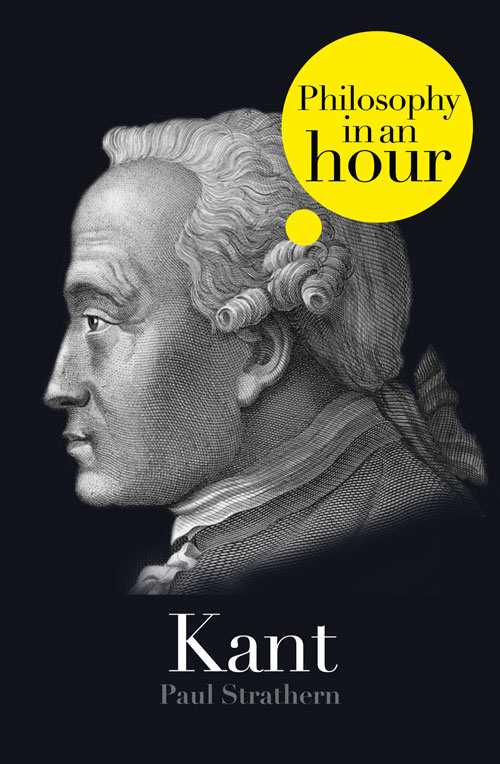
Kant
PHILOSOPHY IN AN HOUR
Paul Strathern

Contents
Cover
Title Page
Introduction
Kant’s Life and Works
Further Information
A Dialogue on Kant and Metaphysics
From Kant’s Writings
Chronology of Significant Philiosophical Dates
Chronology of Kant’s Life
Chronology of Kant’s Era
Recommended Reading
About the Author
Copyright
About the Publisher
Introduction
Just because a thing is impossible, this doesn’t mean someone won’t try to do it. Kant not only tried but succeeded in achieving the impossible. After Hume had destroyed philosophy and any possibility of constructing a metaphysical system, Kant created the greatest metaphysical system of them all. His motive was to refute Hume, but fortunately he had read only Hume’s Inquiry into Human Understanding, not the more penetrating skepticism of his earlier Treatise of Human Nature. Had Kant read this, he might have produced no system. This would have been a great pity and would have left an entire generation of nineteenth-century German philosophy professors without jobs.
Kant’s system is like Newton’s idea of gravity. It’s not the final answer, but it’s close to how we still see the world. You won’t go far wrong if you look at the world Kant’s way. Hume’s philosophy is essentially simplistic: it reduces our philosophical condition to the barren rock of solipsism. Kant, building on the deceptive sands of error, created a wonderful sandcastle of such ingenuity and complexity that it can keep you happily absorbed with your bucket and spade for your entire vacation.
It’s difficult to know what to say about Kant’s life. He didn’t really have one (outside his head). Nothing of any real interest happened to him. But the description of a life of utter tedium need not be boring in itself.
Kant’s Life and Works
Immanuel Kant was born April 22, 1724, in the Baltic city of Königsberg, then the capital of the isolated German province of East Prussia (now Kaliningrad in Russia). Kant’s ancestors had emigrated from Scotland in the preceding century and may well have been related to the notorious seventeenth-century Scottish preacher Andrew Cant, who is said to have been the origin of the verb “to cant” with regard to the use of jargon – a family trait which was to reappear with a vengeance in the philosopher.
At the time of Kant’s birth East Prussia was recovering from the devastation of war and plague, which had reduced the population by over half. Kant grew up in an atmosphere of pious poverty. He was the fourth child of the family, which eventually included five sisters and one other brother. Kant’s Scottish father was a cutter of leather straps who jocularly claimed that he “could never make both ends meet” either at home or at work. Kant always remained respectful of his likable but financially harassed father, and as a child is said to have enjoyed watching him deftly cutting up pieces of leather for harnesses. Yet according to the philosophical psychologist Ben-Ami Scharfstein, in the light of his father’s dexterity “Kant’s great clumsiness with his hands is therefore noteworthy.”
Whether or not this is the case, and what precisely it might be noteworthy of, the main early influence in Kant’s life was undoubtedly his mother. Frau Kant was a wholly uneducated German woman who is said to have possessed great “natural intelligence.” It was this which particularly influenced her son Immanuel – or Manelchen as she called him (“Little Manny”). Kant’s mother would take him for walks in the countryside and tell him the names of the plants and flowers. At night she would show him the stars, naming them and their constellations. She was a pious woman, and her loving but austere ways also helped shape her son’s moral character. This dual insistence on facts and moral obligation was to remain with Kant throughout his life and played a leading role in his philosophy. Kant’s most celebrated remark, made over fifty years later, harks directly back to these early days with his mother: “The starry heavens above and the moral law within fill the mind with an ever new and increasing admiration and awe, the more often and the more steadily we reflect.”
Kant was brought up in a strict Pietist atmosphere and from age eight until sixteen went to the local Pietist school. Here his exceptional intelligence and keen thirst for learning quickly grew irked with the endless religious instruction. This dislike of formal religion was to remain with him for the rest of his days (in mature life he never attended church). Despite this, Kant retained much of the Pietist outlook, with its belief in a simple way of life and adherence to strict morality.
In 1737 Kant’s mother died and received a pauper’s burial. Kant was thirteen at the time and has indicated that he experienced his first sexual stirrings around this period. Psychologists have suggested that the loss of his beloved mother at this stage of puberty caused him to feel guilty and repress his sexual feelings. Either this or they simply withered away. Whatever the cause, from now on Kant was to live a life of sexual repression which assumed heroic proportions.
At the age of eighteen Kant was admitted to the University of Königsberg as a theological student. Initially he was given financial assistance by the local Pietist church, but he also helped support himself by tutoring some of his more backward colleagues. He soon grew bored with theology and began showing a strong interest in mathematics and physics. He read Newton, who opened his eyes to science and the great advances being made in all parts of it, from astronomy to zoology. Science based on experiment could only be accommodated in an empiricist philosophy, that is, one which bases our knowledge of the world on experience. In 1746, when Kant was twenty-two, his father died. Kant and his five younger sisters were left penniless. The younger of these sisters were taken in by a Pietist family while the older ones went to work as chambermaids. Kant applied unsuccessfully for a job at a local school and was forced to leave the university without taking a degree.
For the next nine years Kant supported himself as a tutor to wealthy families in the surrounding countryside. For a while he was employed by the Count and Countess Keyserling (the aristocratic family which was later to produce the pseudophilosopher Hermann Keyserling, whose uplifting but bogus ideas were to prove such a comfort to disillusioned society matrons after World War I). Whenever Kant had a little extra cash he would send some of it to his less fortunate sisters, a habit he continued throughout his later life. His five sisters were to continue living in Königsberg (a city with just fifty thousand inhabitants) throughout the whole of Kant’s life. Yet he saw none of them for over twenty-five years. When one of his sisters finally came to visit him he did not even recognise her. After it was explained to him who she was, he apologised to the rest of the company for her lack of culture. Kant may not have been a social snob, but he was renowned for his inability to tolerate fools. Even in his own family, it would seem.
Yet this incident raises a curious point. Kant’s sister must surely have borne more than a passing resemblance to their mother, both intellectually and physically. She would even have been around the same age as Kant’s mother when she brought him up. Does this mean that Kant’s celebrated love for his mother had become so deep that he no longer recognised it? Suggestion has been made that Kant unconsciously resented the repressive nexus – facts, morality, sexual extinction – imposed on him by his mother. His inability to recognise his sister (or indeed have anything to do with her) may well have followed from this, but we have no way of knowing. (Kant’s sheer lack of life has perversely attracted far more attention from psychologists than the comparatively normal life lived by other philosophers.)
Kant may have been indifferent toward his own family, but he appears to have enjoyed life among the rich families where he was employed as a tutor. His appearance was as much an oddity as his character. He was less than five feet tall, and his head was disproportionately large for his body. His frame suffered from a slight corkscrew twist, which made his left shoulder droop, his right shoulder curve back, and his head tend to lean to one side. Dressed in threadbare clothes and with scarcely a pfennig to his name, he had not exactly been the hit of the campus at the University of Königsberg (which was itself hardly a center of cosmopolitan society). But now, decked out by his employers in his elegant tutor’s outfit, and encouraged to mingle with family guests, Kant positively blossomed. He soon developed a ready wit, acquired a veneer of sophisticated assurance, and became a mean hand at the card and billiard tables. When the families departed for their summer vacations in the country, Kant accompanied them, sometimes journeying almost forty miles from Königsberg. (This was the farthest he was ever to travel from his provincial home city throughout his life.) But this period of comparative elegance was only a phase.
In 1755, at the age of thirty-one, Kant was at last able to take his degree at the University of Königsberg, partly owing to the charity of a Pietist benefactor. This was late to be finishing a degree; and, as we shall see, Kant was an unusually late developer. By this age almost all the other major philosophers had already begun formulating the ideas for which they would be remembered. Not until two decades later did Kant really begin to produce original philosophy.
Kant was now able to take up a post at the university as a privatdozent (junior lecturer). This post he held for the next fifteen years, living a bachelor academic existence of unremitting industry. During this time he lectured mainly on mathematics and physics, and published treatises on a wide range of scientific subjects. These included volcanoes, the nature of winds, anthropology, the cause of earthquakes, fire, the aging of the earth, even the planets (which he predicted would all one day be inhabited, those farthest from the sun developing the species with the highest intelligence).
Yet Kant’s natural bent was toward speculation. He continued to read widely in philosophy. In rationalistic philosophy his ideas were most influenced by Newton and Leibniz. Newton’s greatest achievements may have been in physics and mathematics, but in those days these subjects were still considered part of philosophy, as “natural philosophy.” The full title of Newton’s greatest work is Philosophiae Naturalis Principia Mathematica (The Mathematical Principles of Natural Philosophy). Kant studied Newton with sufficient thoroughness to propose a “New Theory of Motion and Rest” which opposed Newton’s view. The fact that he had misunderstood Newton is not the point. He was being led to speculate on systems which encompassed the universe and was willing to question the greatest intellect of the era on his own ground.
According to Leibniz the physical world of cause and effect proved the inner harmony of the world’s moral purpose. Reading Leibniz led Kant to see humanity as not only participating in nature, but over and above this participating in the ultimate purpose of the universe.
At the same time Kant’s interest in the philosophy of science led him to read the Scottish philosopher Hume. Kant was impressed by Hume’s insistence on experience as the basis of all knowledge. This squared with the scientific approach. But Kant found himself unable to accept the skeptical conclusions that Hume drew from his rigid empiricism. According to Hume, all we experience is a sequence of perceptions – and this means that such notions as cause and effect, bodies and things, even the controlling hand of God the creator, are all mere suppositions or beliefs. None of them is ever actually experienced.
Surprisingly Kant was also struck by the emotional appeal of Rousseau. The first of the romantics, Rousseau was the most unacademic of all philosophers, believing in personal expression through emotion more than rational thought. His advocacy of liberty was to prove a heady inspiration for the French Revolution. Kant may have been an essentially dry character, but there was something in Rousseau that touched a chord in his deeply suppressed emotions. Beneath the façade of the prim academic beat the heart of a closet romantic – and this was later to become apparent in his philosophy. But for the time being all these disparate elements – Newton, Leibniz, Hume, Rousseau – remained just that. Not until Kant found a way of reconciling and absorbing these influences would he be able to produce original philosophy. And the enormity of such a task would take a long time.
Perhaps Kant became impatient, for there now occurred an odd episode. Instead of publishing another serious academic work, Kant wrote a curious satirical book called Dreams of a Ghost-Seer Elucidated by Means of Metaphysical Dreams. The “ghost-seer” of the title is the Swedish visionary mystic Swedenborg, famous for his descriptions of his lengthy travels through heaven and hell. In 1756 Swedenborg had published his eight-volume masterwork Arcana coelestia (The Secrets of Heaven). Unfortunately sales did not go well, and after ten years only four copies had been sold. One of these is now known to have been bought by Kant. These volumes of metaphysical mumbo jumbo had a profound effect on Kant – enough to inspire him to write an entire book satirising them. As Kant whimsically declares in his introduction: “The author confesses with a certain humility that he was so simple-minded as to track down the truth of some tales of the sort mentioned. He found – as usual, where one has nothing to look for – he found nothing.” Yet it soon becomes evident that Kant’s mockery of “the worst visionary of them all” and of “sundry airy thought-worlds … hewn … out of fraudulent concepts” is not quite what it seems. Beneath his consistent raillery and expressions of intellectual contempt is an unmistakable element of profoundly serious interest in Swedenborg. Kant longed to believe in metaphysics (even if not in quite such an extreme form), but his formidable intellectual development was beginning to close down this avenue.
Kant’s writing style is notoriously prolix and difficult, but by all accounts his lectures were quite the opposite. His body was so short and twisted that only his bewigged head, with its prim, precise features, was visible above the lectern. But this talking head was a font of wit, fascinating erudition, and ideas. Kant’s lectures were a great hit, and his fame soon spread, encouraged by his stream of treatises on scientific subjects. His celebrated summer lectures on geography always attracted crowds from outside the university. These continued for over thirty years and established Kant as the first academic teacher of physical geography, despite the fact that throughout his life he never set eyes on a mountain and may never even have seen the open sea (which was almost twenty miles away). Kant’s vivid and perceptive descriptions brought to life the wonders of the distant lands that he read about with such enthusiasm during the long winter evenings, when the freezing Baltic fog drifted in through the streets of remote provincial Königsberg.
Kant now also began delivering lectures on philosophy, and here it soon became apparent that he had journeyed far and wide through the hostile territories of ethics and epistemology, beyond the ultima Thule of logic and even into regions so remote from civilisation as metaphysics (and had lived to tell the tale). Meanwhile treatises on more amenable subjects, such as fireworks, military defense, and the theory of the heavens, continued to pour from his pen. Despite this, Kant was twice refused a professorship at the University of Königsberg. The reasons for this are unclear, but one suspects an element of provincial snobbery. Or perhaps they just didn’t like him. Either way, Kant certainly liked Königsberg. When he was offered the prestigious post of professor of poetry at the University of Berlin, he turned it down.
Fortunately in 1770 the Königsberg University authorities relented, and Kant was appointed professor of logic and metaphysics. Now, at age forty-six, he had grown increasingly critical of Leibniz and his rationalistic disciples who had become the dominant force in German philosophy. Hume’s empiricism seemed undeniable, and reluctantly Kant even became convinced by Hume’s skepticism. Objects, cause and effect, continuity, even the self – all these appeared to be fallacious notions. They remained beyond the reach of our experience, which was the only certain source of our knowledge. Kant accepted this because it seemed to him intellectually irrefutable. But he was not happy with this barren state of affairs. There appeared to be no further room for philosophy to continue. Was this really the end?
Then one day, while studying Hume’s Inquiry Concerning Human Understanding, Kant “awoke from his dogmatic slumbers.” In a flash of inspiration he saw how he could construct a system and answer the destructive skepticism of Hume which had threatened to destroy metaphysics forever.
For eleven years Kant published nothing, but continued working out his philosophy. Already he had begun living a life of extreme regularity, and during this period his routine began to achieve legendary status. In the words of Heine: “Rising, coffee drinking, writing, lecturing, dining, walking, each had its set time. And when Immanuel Kant, in his grey coat, cane in hand, appeared at the door of his house, and strolled towards the small avenue of linden trees which is still called ‘The Philosopher’s Walk,’ the neighbours knew that it was exactly half past three by the clock. So he promenaded up and down, during all seasons; and when the weather was gloomy, or the grey clouds threatened rain, his old servant Lampe was to be seen plodding anxiously after, with a large umbrella under his arm, like a symbol of Prudence.” Only on one famous occasion is Kant said to have broken this routine: on the day he started reading Rousseau’s Émile,
Конец ознакомительного фрагмента.
Текст предоставлен ООО «ЛитРес».
Прочитайте эту книгу целиком, купив полную легальную версию на ЛитРес.
Безопасно оплатить книгу можно банковской картой Visa, MasterCard, Maestro, со счета мобильного телефона, с платежного терминала, в салоне МТС или Связной, через PayPal, WebMoney, Яндекс.Деньги, QIWI Кошелек, бонусными картами или другим удобным Вам способом.


